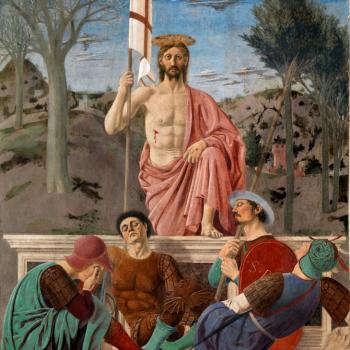Aquinas's arrangement explains why in the Catholic mind Jesus is not the sole actor in salvation and why Spirit and liturgy, saints and sacraments are also central. The Reformers refused to countenance this, viewing it as a diminishment of Christ. For Protestants, Jesus alone is redemptor, given once for all, the vital ultimate expression of the passionate love of God for sinners breaking through our captivity to sin in order to rescue us from certain death and damnation. Humans do nothing because they can do nothing.
Yet the Reformers' accent on human depravity has always left a puzzling question swimming around the minds of the faithful. If people were created in the image of God, how is it that that image became so irrevocably damaged? Does not even a residue, a trace of that image remain? If no one is good, no not one, on what basis would any person ever desire Christ or yearn toward God in the first place?
The Reformers responded by emphasizing the doctrine of election and grounding it in God's mercy and holiness. That God would save even one sinner is testimony to his infinite love. Yet such assertions about God have proven dissatisfying to many, mostly because it seems to make God into a capricious deity who chooses some and rejects others solely on the basis of his own impulse. At worse, human beings become analogous to marionettes, puppeted about in accordance with divine whimsy. No one disputes that God is free to do as he wills, yet the nagging problem with divine election is that such behavior makes the all-loving Creator appear less loving than his creatures.
Historically, theologians have wrestled with a variety of workarounds. Are humans inherently good? (No, this heresy called Pelagianism was rejected by Augustine in the 5th century because it would either have made Jesus a joke or his death a horrific injustice.) Are humans sort of good? (No, that's called semi-Pelagianism, same objections.) Perhaps God chooses, but chooses only those sinners he knows will choose him. (That's called Arminianism and depends upon God's foreknowledge, yet even Aquinas would have rejected this, arguing that for an eternal being, time doesn't exist. Thus there can be no "fore" anything. Everything is eternally present.) Which brings us back to God choosing those he chooses for reasons he chooses. (This is usually called Calvinism, or in the words of its critics, Armeeny-miny-moism.)
Refusing to presume that the power of sin was sufficient to damage the divine image, Aquinas held that by God's grace, the requisite goodness to choose God, traces of the image, remained in people. Protestants who view faith as a function of human will have typically employed the analogy of a leap of faith to illustrate. Author Sheldon Vanauken, in his classic A Severe Mercy, following several years of studying Christianity, presented it like this,
Christianity -- in a word the divinity of Jesus -- seemed probable to me. But there is a gap between the probable and the proved. How was I to cross it? If I were to stake my whole life on the risen Christ, I wanted proof. Wanted certainty. I wanted to see Him eat a bit of fish. I wanted letters of fire across the sky. I got none of these. And I continued to hang about on the edge of the gap. The problem was that in my own easygoing theism, I had regarded Christianity as a sort of fairy tale; and I had neither accepted nor rejected Jesus since I had never, in fact, encountered Him. Now I had. The position now was not, as I had been comfortably been thinking all these months, merely a question of whether I was to accept the Messiah or not. It was a question of whether I was to accept Him or reject. My God! There was a gap behind me too. I could not reject Jesus. There was only one thing to do, once I had seen the gap behind me. I turned away from it and flung myself over the gap towards Christ.
Vanauken testifies to the limits of finite reason, yet in the end his motivation for faith seems little more than a modified version of Pascal's wager. Pascal argued that if you were to accept Christ only in the end to discover it was all a hoax, well, no harm done. A few decades of church never really hurt anybody too badly. But if you rejected Christ only in the end to discover it was all true, well, you'd be toast. Consequently, Pascal, Vanauken, and others did the only rational thing.
But something is missing. Here's where Aquinas can be of help. Reconsider the analogy and you'll see that when pushed, it breaks down at this point: Who in their rational mind would ever jump off the edge of a cliff, metaphorical or otherwise, due to the limits of their knowledge? Seems like any rational person would wait to get more information. Jumping is not the reasonable, natural thing to do; in fact, it's completely unnatural -- or as Aquinas would have insisted, supernatural.
If you have ever stood on a high cliff overlooking the sea or a gorge, you've probably felt not a compulsion to step away, but a strange, palpitating pull toward the brink. It's crazy, but you've felt it. Your feet shuffle and your heart thumps and you stick your head over the edge and revel in the exhilaration of the moment. That pull, that longing, that yearning to be freed from your limits, Aquinas would have asserted it to be analogous to the lure of the Spirit on your soul, the presence of the divine image summoning you home. It's what gives you the courage in spite of the limits of reason to go for it anyway. Does God choose us? As far as we can tell, yes. Do we choose God? As far as we can tell. God sifts divinity into the dust, endowing it with things that belong to God alone. When God is through with it, the dust will bear the divine likeness. When God is through with it, this dust will exercise God's own dominion . . . God's own will.





